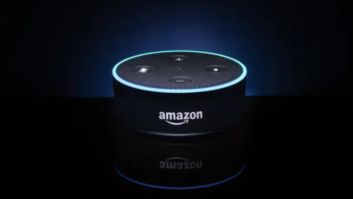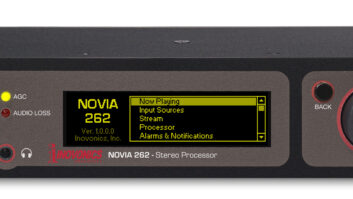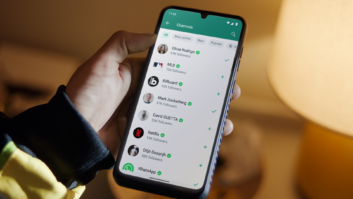
Consumer tech brands are gradually expanding their share of the exploding smart-speaker market despite the dominance of the Amazon and Google brands.
Amazon and Google dominate because of their first-to-market advantage and ample marketing and engineering resources. Amazon accounted for 64.4% of the U.S. installed base as of September 2018, and Google for 19.6%, a September 2018 Voicebot survey found. Brands other than Amazon, Google and Apple, however, have grown their share of the installed base from 9.7% in January 2018 to 11.3% in September 2018, Voicebot said.
When U.S. smart-speaker owners were asked in a mid-2018 survey to name a brand they’d choose for their next purchase, 54% chose Amazon, Google or Apple, but almost half cited other brands.
Strategy Analytics finds plenty of opportunity for other brands. When U.S. smart-speaker owners were asked in a mid-2018 survey to name a brand they’d choose for their next purchase, 54% chose Amazon, Google or Apple, but almost half cited other brands.
Brand considerations: “Many consumers are ready to consider alternative brands, assuming they meet the high expectations identified in this study, including high quality audio, superior design and device compatibility,” said David Watkins of Strategy Analytics.
Nonetheless, CE brands won’t match Amazon or Google sales anytime soon because the tech giants offer many more products at prices lower than what many CE brands might be able to offer profitably, Futuresource said. The tech giants’ primary goal, added Stephen Baker, NPD Group technology industry advisor, “is to build an installed base” to deliver voice services, and that means “the vast majority of volumes” will be in aggressively priced, low-cost, low-audio-quality Amazon Dots and Google Home Minis.
Many CE brands — at least 30 in 2018 — already offer smart speakers, and so far, the winners consist of JBL and Sonos. Excluding Amazon and Google, those two led the pack in U.S. retail-level unit sales with shares of 6% and 4%, respectively, for the 12 months ending September 2018, the NPD Group found. Other brands, including Apple, accounted for another 6%.
Picking niches: Suppliers, however, must pick their niches carefully, said Dannie Lau, Xperi’s DTS Play-Fi at GM. Companies competing on price “will have a difficult time matching the scale and development cycles of Google and Amazon,” he said. But “traditional CE companies have historically been able to create price segmentation with ever-improving sound quality and design.”
Even a small share of an exploding market is significant for many companies. Based on a September 2018 consumer survey, Strategy Analytics forecast that U.S. smart-speaker shipments would jump 86% to 42.4 million in 2018, with the installed base growing 123% to 71.2 million. Sales are driven by new users and by repeat purchasers adding speakers to more rooms.
Up to 48% of U.S. consumers were expected to own a smart speaker by the end of 2018, an August 2018 Adobe Analytics study concluded.
The death knell, however, hasn’t sounded for Wi-Fi speakers lacking built-in assistants.
Other Wi-Fi Speakers: The death knell, however, hasn’t sounded for Wi-Fi speakers lacking built-in assistants. “Built-in AI will be a component of every manufacturers’ product plans, though it is doubtful microphones will find their way into the entire lineup,” said DTS’s Lau. As long as suppliers can’t integrate more than one AI assistant into a single speaker SKU, “it makes more sense to use a ‘works with’ strategy to appeal to the broadest audience.”
Brendon Stead, Sound United’s SVP of product development/engineering, also sees “great” potential for wireless multiroom speakers lacking built-in assistants. However, he said, “these speakers must interact with existing voice agents to stay relevant.” One key to success is “broad interoperability with more than one smart assistant simultaneously, like we’re seeing with Denon and Marantz AVRs,” Stead said.
Suppliers unveiling smart speakers include:
- Cleer Audio: The company’s latest smart speaker with Alexa voice control is the $149-suggested Connect Smart Display Speaker, due in Q2 with 8-inch color display, Wi-Fi, Bluetooth, and far-field mics. The $249 Space speaker is already available.
- JBL: The Samsung-owned Harman brand is showing the JBL Link Bar, which is the first announced sound bar with both built-in Google Assistant and Android TV. It’s due in the spring. Pricing was unavailable.
- LG: The company’s first three sound bars with built-in Google Assistant feature Dolby Atmos and DTS:X 5.1.2-channel sound, far-field mics in the chassis, Chromecast built-in, and Meridian Audio design, and two optional wireless surround speakers.
- Voiz: The New York-based startup, co-founded by former Onkyo and JBL executive Mark Friedman, is unveiling its first three Ai Radio SKUs with built-in Amazon Alexa, classic-radio aesthetic, premium components, and premium look with bamboo cabinets and removable cloth grilles. The company also plans later this year to offer in-wall Smart Switch devices that replace standard wall switches, enabling voice control of whole-house audio and smart-home systems.
Read more insightful CES coverage over at TWICE or check out the social hype surrounding the show’s highlights.











